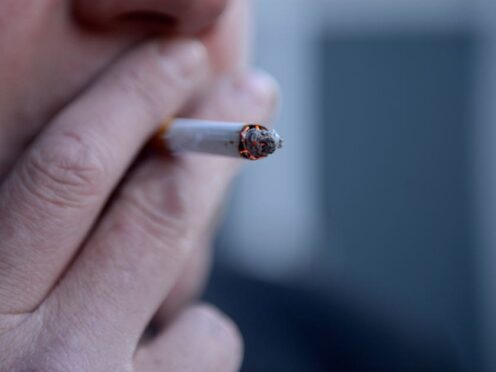A Bill banning the next generation from being able to buy cigarettes is being introduced to Parliament on Wednesday.
The Tobacco and Vapes Bill will restrict the sale of tobacco so that anyone turning 15 this year, or younger, will never legally be sold cigarettes.
It will effectively raise the age of tobacco sale by one year every year, with the aim of stopping today’s youngsters from ever taking up smoking in the first place.
Government figures show that smoking costs the UK around £17 billion a year, including £10 billion every year through lost productivity alone.
It says this cost dwarfs the £10 billion raised through taxes on tobacco products.
If the Bill passes, ministers say smoking rates among those aged 14-30 could be near zero by 2040.
Some Tory MPs have expressed concerns about the plans, with former prime minister Liz Truss saying they are “profoundly unconservative”.
Earlier, this year, she said: “A Conservative government should not be seeking to extend the nanny state. It only gives succour to those who wish to curtail freedom.”
But Labour has given backing to the move, which is subject to a free vote in Parliament.
Under the changes, smoking itself will not be criminalised and anyone who can legally buy tobacco now will not be prevented from doing so.
The Bill will also tackle youth vaping, by introducing new powers to restrict vape flavours and packaging intentionally marketed at children.
This could change how vapes, which contain nicotine, are displayed in shops, moving them out of sight of children and away from other products such as sweets.
Figures show that one in five children has tried vaping despite it being illegal for under-18s, while the number of children using vapes has tripled in the past three years.
Other powers in the Bill mean enforcement officers will be able to give £100 on-the-spot fines to clamp down on underage sales of tobacco and vaping products.
This is in addition to the maximum £2,500 fine that local authorities can already impose.
It will also be illegal for retailers to give free samples of vapes to under-18s.
Separately, the Government has committed to ban disposable vapes from April 2025 under environmental laws.
Health campaigners have repeatedly said that offering disposables for “pocket money prices” encourages children to take up vaping.
Figures also show disposable vapes are the e-cigarette of choice among youngsters, with purchases mostly made from corner shops.
Prime Minister Rishi Sunak, said: “If we want to build a better future for our children we need to tackle the single biggest entirely preventable cause of ill-health, disability and death: smoking.
“That is why, alongside new measures to curb the alarming rise in youth vaping, we are delivering on our commitment to create a smoke-free generation and stop our kids from getting hooked on harmful cigarettes and other nicotine products.
“This important change will save thousands of lives and billions of pounds for our NHS, freeing up new resource than can be spent to improve outcomes patients right across the UK.
Health and Social Care Secretary Victoria Atkins said: “Smoking kills. It takes around 80,000 lives in the UK every year and causes one in four cancer-related deaths.
“It’s therefore only right we take robust action to protect future generations from these harmful products.
“Today is a significant milestone, representing the single biggest preventable health policy in a generation with a first-of-its-kind Bill aimed at preventing our children and young people from falling prey to a lifetime of nicotine addiction.”
England’s chief medical officer, Professor Chris Whitty, said: “Smoking causes harm across the life course. This includes stillbirth, asthma, heart disease, chronic obstructive pulmonary disease, 15 different types of cancer, stroke and dementia.
“If passed this will be a major public health measure which reduce illness, disability, and premature deaths for children today and future generations.”
Deborah Arnott, chief executive of Action on Smoking and Health, said: “The groundbreaking legislation put before Parliament today sets a course to the extinction of smoking in the UK.
“Every day, 350 young adults aged between 18 and 25 start smoking regularly, risking a lifetime of addiction, disease, disability and premature death.
“Smoking is the silent killer that hides in plain sight, killing more people than Covid at the height of the pandemic. Ending this scourge on society cannot come soon enough.“
Simon Clark, director of the smokers’ rights group Forest, said the Government has no mandate to ban the sale of tobacco to future generations of adults.
He added: “No-one wants children to smoke, but the idea that Government should take away people’s freedom to choose long after they have grown up is absurd.
“Instead of rushing this vanity project through Parliament, the Prime Minister should include the policy in the Tories’ election manifesto and let the people decide.”
